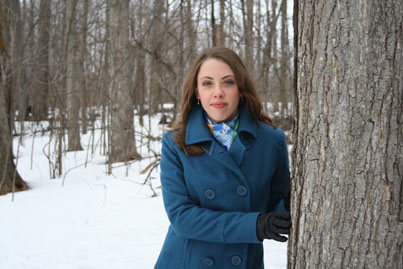Sarah Burnell: Canadian Folk Music Award-winner isn’t just fiddling around
Sarah Burnell: Canadian Folk Music Award-winner isn’t just fiddling around McGill University
User Tools (skip):
Profile
Sarah Burnell: Canadian Folk Music Award-winner isn't just fiddling around

First-year student Sarah Burnell prefers the driving Cape Breton style of fiddling because it has more "dirt."
Natalie Albert
Eight years ago, violinist Sarah Burnell found herself at a crossroads. Despite her undeniable talent and potential, her passion for the instrument had waned. For the first time, she was considering laying down her bow. While musicians too many to number have experienced this musical equivalent of a mid-life crisis, there was one major difference for Burnell. She was only 10 years old.
Recognizing that her young charge was bored by Beethoven and being lulled to sleep by Brahms, Burnell's teacher, Nancy Eadie, added a pinch of Celtic fiddle tunes to spice up the Ottawa girl's regular diet of classical pieces. The recipe proved to be the perfect antidote to Burnell's ennui. "It was like a little light went on," Burnell said.
Unlike other classically trained musicians who have broken away to explore new genres, Burnell did not cross the figurative floor. Although she embarked upon a voyage of Gaelic discovery, she remained hooked on classics.
Today, the 18-year-old straddles both worlds effortlessly. A case in point: This past November the first-year Violin and Music Education student was an orchestra member for Opera McGill's production of Dido and Aeneas. Three weeks later, she was in Edmonton thanking the little people after being named Young Performer of the Year at the Canadian Folk Music Awards on the strength of her first CD, "Sara'ndipity." Multitasking has never sounded so good.
The genesis of the aptly named CD was indeed somewhat serendipitous. Attending the 2005 Kingston Folk Festival, Burnell met Paul Miller, a Toronto-based record producer and engineer. Liking what he heard, he invited Burnell to lay down some tracks at his studio.
"For most of us in the band, it was the first time we had been in a professional studio," Burnell remembered. "A lot of people go into a studio unprepared, just expecting it to happen, but we had rehearsed like crazy beforehand. We didn't want to waste anyone's time."
The practice paid off, with the session sounding so good that the original plan of recording five songs was scrapped on the spot in lieu of producing a full-blown CD.
The Edmonton win changed the McGillian's plans. "Fiddling was supposed to be put on the backburner a bit once I started at McGill, but apparently that won't be happening," she laughed.
Instead, she will continue her melodious balancing act – something she seems quite happy to do. "There is so much musical variety out there," she said. "I don't want to be just one type of musician." Between classes and six hours of Baroque practice a week, Burnell plans to return to the studio later this year to record another folk album.
While she loves the technical challenges presented by classical violin, Burnell feeds off of the intimacy between fiddler and audience. "Celtic and folk music was meant to be played at dances or in the kitchen with your family," she said. "The whole idea is to break the barrier so that it becomes an exchange between people rather than just a performance."
It would be tempting to suggest that Burnell leads a double life, disciplined violinist by day and fiddler of the people by night, but that would ignore the many common areas in which the two genres find true harmony. "A lot of Baroque music is based on dances. It has gigues and Celtic music has jigs and reels," explained Burnell. "Both have many of the same signatures and ornaments. In the end, Baroque has helped my fiddling and fiddling has helped my Baroque."
Burnell is just as serious about her studies in Music Education as she is about her playing. "Teaching is my second love," she said. Since giving her first violin lesson while in high school, she has had students from four to 50 years old. Just as she is attracted to Celtic music for the way it tears down the walls between performer and audience, Burnell's love of teaching is based on the complicity between teacher and student. "I just love being able to share the music," she said.

